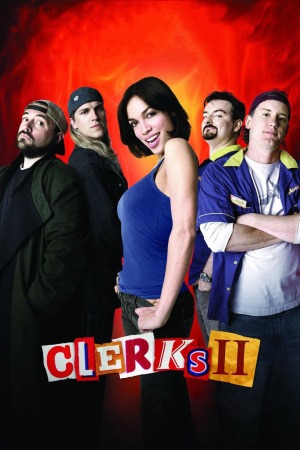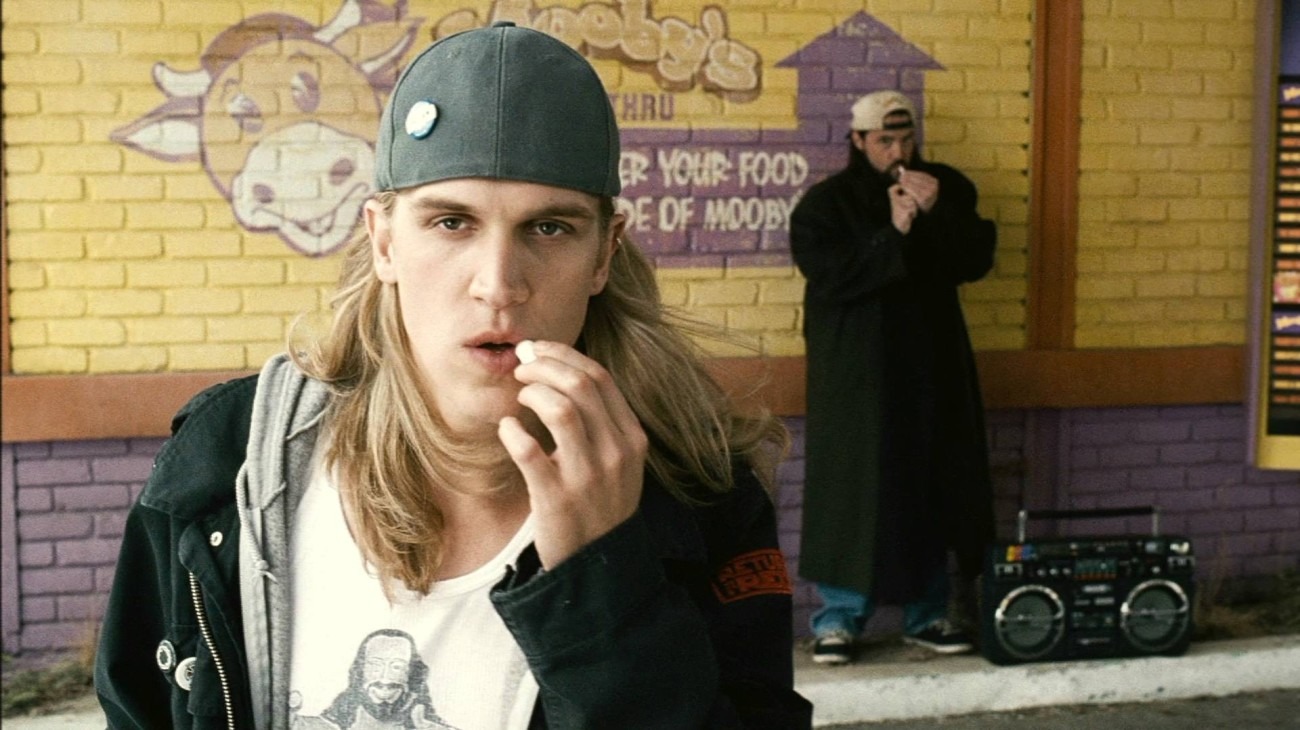
The finest movie ever to end with a Tijuana donkey show
I'm having a hard time deciding if Clerks II is Kevin Smith's career-best film.
Here's the thing: more than any other writer/director I can name, Smith's films are all about the screenplay. On some level I salute this tendency, as it is a refreshing corrective to the legions of indie filmmakers who think that overbaked visual gimcrackery is enough to compensate for an inert story.
Except that there's a difference between foregrounding the script and relying on it, and that is where Smith has traditionally foundered. I've been on the receiving end of plenty of defenses for the first Clerks that attempt to justify the immobile camera and indifferent lighting, but one can only go so far: Smith is not Ozu, and there's a diffence between static shots for emphasis and static shots because the director seems unaware that the camera can actually be moved.
This is where Clerks II shines. Although it is not the first time in the six-film Askewniverse series (I have never seen Smith's 2004 flop Jersey Girl), that the director uses camera movement, it's the first time he's done so with a fair amount of success. There are 360 degree dolly shots to emphasise characters' emotions! There are zooms used to deliberately isolate characters in the frame! Pans are used to slowly reveal information!
In addition to not being Ozu, Kevin Smith is not Renoir; but he's never been closer than he is here. If it sounds like damning with faint praise to congratulate a director for learning how to use, y'know, cinematography after only seven films, I suppose it probably is.
The problem is that Smith is primarily a writer, and so my strict allegiance to auteur theory forces me to grapple with the screenplay of this film above all else. And in that respect, I'm entirely less certain that it's a standout in his canon. The story is considerably less convoluted than most of his recent efforts: ten years after Clerks Dante Hicks (Brian O'Halloran) and Randal Graves (Jeff Anderson) are still working at the Quick Stop, until it is burned down. Still wishing to avoid a real job, they find work at Mooby's, a fast-food joint, and Dante ends up torn between moving to Florida with his fiancée (Jennifer Schwalbach) or staying in New Jersey with Randal and his supervisor (Rosario Dawson) with whom he has a low-key flirtatious relationship.
It makes a fine follow-up to the first film: if that was about the slacker generation feeling secure in their irrelevance, this is about those slackers grown up and wondering what they've missed. There's a curious blend of laughing at and with the characters; it's as though Smith has too much affection for Dante and Randal to mock them outright, but knows at the same time that there's nothing honorable about spending your thirties in the service industry.
This is the primary reason that I can't quite argue that the film reaches the level of the first Clerks or Smith's masterpiece Chasing Amy. Although this film shares those scripts' heart, it gets a little muddy by Smith's apparent superiority over his characters; I can't help but think of it in opposition to Before Sunset, where Linklater approached two characters that we hadn't seen in a decade with understanding and forgiveness for their mistakes. And Kevin Smith is not Richard Linklater, in this respect; without spoiling it, I'd point to the final shot as being a particularly snarky (if funny) critique of his heroes' lack of ambition. Still, the film is sweeter than the first one in this significant respect: it treats much more on the nature of friendship, and mutual dependence between Dante and Randal.
I suppose that I'm being willfully perverse in going this far without mentioning the film as a comedy. The rules are different for comedies, for whatever reason; as long as it's sufficiently funny, most of its sins can be papered over. And Clerks II is sufficiently funny, much more so than the over-earnest and under-directed Dogma or the masturbatory Jay and Silent Bob Strike Back (still the objectively-worst film that I've ever enjoyed for unironic reasons). It takes a little bit too much time to get started, and in the beginning especially it takes some time to get comfortable to listen to Smith's...um..."distinctive" prosody (read: my Lord, do these people sound like they're reciting dialogue). But then it starts to loosen up and get that same listless energy that the first film had, and the cast starts to have fun; especially Anderson, whose epic "Star Wars vs. Lord of the Rings" argument is the funniest thing in any movie so far this year. As usual, there is humor of the lowest-imaginable denominator, and as usual the sweetest character moments occur right along side the foulest gags. It undoubtedly speaks more to the state of modern American filmmaking than Kevin Smith's skill that I found this the funniest movie of the year so far, but there you have it.
Still: an eight-minute standing ovation at Cannes? Are you fucking with me?
7/10
For a distinctly less favorable review, I give you Dave Weigel.
Here's the thing: more than any other writer/director I can name, Smith's films are all about the screenplay. On some level I salute this tendency, as it is a refreshing corrective to the legions of indie filmmakers who think that overbaked visual gimcrackery is enough to compensate for an inert story.
Except that there's a difference between foregrounding the script and relying on it, and that is where Smith has traditionally foundered. I've been on the receiving end of plenty of defenses for the first Clerks that attempt to justify the immobile camera and indifferent lighting, but one can only go so far: Smith is not Ozu, and there's a diffence between static shots for emphasis and static shots because the director seems unaware that the camera can actually be moved.
This is where Clerks II shines. Although it is not the first time in the six-film Askewniverse series (I have never seen Smith's 2004 flop Jersey Girl), that the director uses camera movement, it's the first time he's done so with a fair amount of success. There are 360 degree dolly shots to emphasise characters' emotions! There are zooms used to deliberately isolate characters in the frame! Pans are used to slowly reveal information!
In addition to not being Ozu, Kevin Smith is not Renoir; but he's never been closer than he is here. If it sounds like damning with faint praise to congratulate a director for learning how to use, y'know, cinematography after only seven films, I suppose it probably is.
The problem is that Smith is primarily a writer, and so my strict allegiance to auteur theory forces me to grapple with the screenplay of this film above all else. And in that respect, I'm entirely less certain that it's a standout in his canon. The story is considerably less convoluted than most of his recent efforts: ten years after Clerks Dante Hicks (Brian O'Halloran) and Randal Graves (Jeff Anderson) are still working at the Quick Stop, until it is burned down. Still wishing to avoid a real job, they find work at Mooby's, a fast-food joint, and Dante ends up torn between moving to Florida with his fiancée (Jennifer Schwalbach) or staying in New Jersey with Randal and his supervisor (Rosario Dawson) with whom he has a low-key flirtatious relationship.
It makes a fine follow-up to the first film: if that was about the slacker generation feeling secure in their irrelevance, this is about those slackers grown up and wondering what they've missed. There's a curious blend of laughing at and with the characters; it's as though Smith has too much affection for Dante and Randal to mock them outright, but knows at the same time that there's nothing honorable about spending your thirties in the service industry.
This is the primary reason that I can't quite argue that the film reaches the level of the first Clerks or Smith's masterpiece Chasing Amy. Although this film shares those scripts' heart, it gets a little muddy by Smith's apparent superiority over his characters; I can't help but think of it in opposition to Before Sunset, where Linklater approached two characters that we hadn't seen in a decade with understanding and forgiveness for their mistakes. And Kevin Smith is not Richard Linklater, in this respect; without spoiling it, I'd point to the final shot as being a particularly snarky (if funny) critique of his heroes' lack of ambition. Still, the film is sweeter than the first one in this significant respect: it treats much more on the nature of friendship, and mutual dependence between Dante and Randal.
I suppose that I'm being willfully perverse in going this far without mentioning the film as a comedy. The rules are different for comedies, for whatever reason; as long as it's sufficiently funny, most of its sins can be papered over. And Clerks II is sufficiently funny, much more so than the over-earnest and under-directed Dogma or the masturbatory Jay and Silent Bob Strike Back (still the objectively-worst film that I've ever enjoyed for unironic reasons). It takes a little bit too much time to get started, and in the beginning especially it takes some time to get comfortable to listen to Smith's...um..."distinctive" prosody (read: my Lord, do these people sound like they're reciting dialogue). But then it starts to loosen up and get that same listless energy that the first film had, and the cast starts to have fun; especially Anderson, whose epic "Star Wars vs. Lord of the Rings" argument is the funniest thing in any movie so far this year. As usual, there is humor of the lowest-imaginable denominator, and as usual the sweetest character moments occur right along side the foulest gags. It undoubtedly speaks more to the state of modern American filmmaking than Kevin Smith's skill that I found this the funniest movie of the year so far, but there you have it.
Still: an eight-minute standing ovation at Cannes? Are you fucking with me?
7/10
For a distinctly less favorable review, I give you Dave Weigel.
Categories: comedies, indies and pseudo-indies, stoopid comedies






